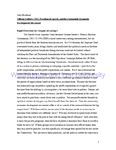| dc.rights.license | In Copyright | en_US |
| dc.creator | Headland, John | |
| dc.date.accessioned | 2013-11-22T15:50:56Z | |
| dc.date.available | 2013-11-22T15:50:56Z | |
| dc.date.created | 2011 | |
| dc.identifier | WLURG38_Headland_POV_2011_wm | |
| dc.identifier.uri | http://hdl.handle.net/11021/24136 | |
| dc.description | Capstone; [FULL-TEXT FREELY AVAILABLE ONLINE] | en_US |
| dc.description | John R. Headland, II is a member of the Class of 2012 of Washington and Lee University School of Law. | en_US |
| dc.description.abstract | The United States Supreme Court decision Citizens United v. Federal Election Commission, 130 S.Ct. 876 (2009) caused controversy among commentators, but the practical fallout from the decision remains unclear. In a 5-4 decision, the Supreme Court overturned twenty years of legal history and established that political speech in the form of independent political broadcasts during elections could not be limited without violating the First and Fourteenth Amendments of the United States. The direct result of the decision was the repealing of the 2002 Bipartisan Campaign Reform Act (BCRA), lifting an effective ban on "electioneering" broadcasts – broadcasts made within 30 days of an election or primary endorsing or critiquing a specific candidate – paid for by for-profit corporations, not-for-profit corporations, and unions. But it also overturned the earlier decision Austin v. Michigan Chamber of Commerce, 494 U.S. 652 (1990), and ruled that the threat of political corruption is not a sufficient government interest to limit the speech of organizations based on their status as corporations. . . . Does the community economic development movement suffer at all as a result of the increased freedom for big corporations? Will these entities remain intact if the decision results in an increase in discourse from entities with different views? Will they be forced to spend more of their money than they had in the past to deal with the rising tide of influence? And what does it mean for poverty programs when the facts of political discourse force them to sacrifice funds for survival? If these groups are to maintain or increase their effectiveness, then they may need to push for laws that specifically advantage their speech but do not violate the Constitution. The answers to these questions, and the political outlets for community development organizations, may lie in new developing legal situations, or the adaptation of older concepts of equal rights. [From introductory section] | en_US |
| dc.description.statementofresponsibility | John Headland | |
| dc.format.extent | 21 pages | en_US |
| dc.language.iso | en_US | en_US |
| dc.rights | This material is made available for use in research, teaching, and private study, pursuant to U.S. Copyright law. The user assumes full responsibility for any use of the materials, including but not limited to, infringement of copyright and publication rights of reproduced materials. Any materials used should be fully credited with the source. | en_US |
| dc.rights.uri | http://rightsstatements.org/vocab/InC/1.0/ | en_US |
| dc.subject.other | Washington and Lee University, Shepherd Poverty Program | en_US |
| dc.title | Citizens United v. FEC, Freedom of Speech, and the Community Economic Development Movement | en_US |
| dc.type | Text | en_US |
| dcterms.isPartOf | RG38 - Student Papers | |
| dc.rights.holder | Headland, John | |
| dc.subject.fast | Elections -- U.S. states | en_US |
| dc.subject.fast | United States. Federal Election Commission | en_US |
| dc.subject.fast | Broadcasting -- Political aspects | en_US |
| dc.subject.fast | Community development -- Economic aspects | en_US |
| dc.subject.fast | Political campaigns | en_US |
| local.department | Shepherd Poverty Program | en_US |
| local.scholarshiptype | Capstone | en_US |
